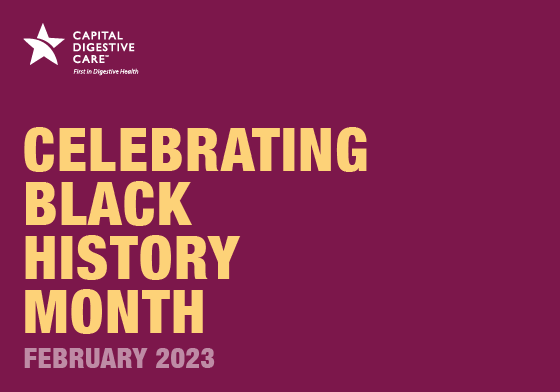
This year, Capital Digestive Care is marking Black History Month by celebrating the contributions of African-American trailblazers in medicine. Throughout February, we will be reflecting on the medical professionals whose groundbreaking work contributed to the patchwork of innovation in their fields, many of whom achieved their accomplishments during segregation and other challenging circumstances. We’re proud to celebrate well-known, influential figures, as well as those who are just beginning to receive the recognition they deserve. In many cases, the impact of their pioneering work is significant to this day, along with the inspiration of their work on future generations.
Black History Month
African-American Pioneers in Medicine
James Durham was considered the first African American to formally practice medicine in the U.S. Born a slave, he never obtained an official medical degree, but gained extensive knowledge through apprenticeships with his medical owner-masters. He eventually bought his own freedom and established medical practices.
Dr. James McCune Smith was the first African American physician, earning a degree from the University of Glasgow, Scotland. He was a passionate abolitionist, prolific writer, and entrepreneur. He established the first Black-owned pharmacy in the U.S.
Dr. Rebecca Lee Crumpler was the first African American female doctor in the United States. She began her career in medicine by working as a nurse in Massachusetts and eventually applied to medical school and later began her practice in Boston.
Mary Eliza Mahoney was the first African American to graduate from nursing school and work as a professional nurse in the U.S. She was inducted to both the African American Nurses Association Hall of Fame and the National Women’s Hall of Fame.
Dr. Daniel Hale Williams founded the first Black-owned hospital in America, Provident Hospital, in 1891. It was the country’s first non-segregated hospital.
Dr. William Augustus Hinton was the first Black Harvard University profession and first Black writer to author a published medical textbook. He researched and developed a less painful syphilis detection test, which was adopted by U.S. Public Health Services.
Dr. Leonidas Harris Berry was the first African American specialist in gastroenterology and a pioneer in endoscopy. He invented the Elder-Berry biopsy gastroscope in 1955, which improved the way doctors collected tissue from the stomach without surgery. He also determined that it is not the stomach damaged by alcoholism, but rather the liver, changing the treatment of alcoholism forever.
Dr. Charles Richard Drew was an American surgeon and medical researcher. An expert in blood transfusion, he developed a method for long-term blood plasma storage and large-scale blood banks during World War II.
Vivien Thomas was a champion in cardiac surgery and racial equality. He was never formally credentialed, but he played a critical role in developing the procedure used to treat blue baby syndrome and conducted groundbreaking research on shock and trauma, estimated to have saved thousands of lives.
Henrietta Lacks’s cancer cells are the source of the HeLa cell line, which is the first immortalized human cell line. Her cells have been part of significant biomedical research and led to breakthroughs like the polio vaccine.
Dr. Kenneth Forde pioneered endoscopy as a diagnostic and surgical tool. He rose to the highest ranks of gastrointestinal and colorectal surgery and became an early proponent of routine colonoscopy screening to prevent and detect colon cancer. As part of the effort to raise public awareness, he performed Katie Couric’s first colonoscopy on live television on The Today Show.
Dr. Jocelyn Elders was the first person in the state of Arkansas to become board certified in pediatric endocrinology. She later went on to be the 15th Surgeon General of the United States and the second woman to head the U.S. Public Health Service.
Dr. Sadye Curry is the first African American woman to become a gastroenterologist in the United States and the first female to be elected chair of the Internal Medicine Section of the National Medical Association.
Dr. Vivian Pinn was a celebrated physician who advocated for women’s health research and fought for increasing diversity and inclusion in medicine. Her legacy shaped the landscape of healthcare and research, ensuring that the health needs of women are prioritized.
Dr. David Satcher is known for being a physician and public health leader. He was the first person to have served as both the director for the Centers for Disease Control and Prevention and Surgeon General of the United States.
Dr. Levi Watkins is a celebrated cardiac surgeon. He performed the world’s first successful implantation of an automatic defibrillator in a human patient, developed pioneering techniques for open heart surgery including some that are still used today, and served as the first African American chief resident in cardiac surgery at Johns Hopkins University Hospital.
Dr. Georges Benjamin is a champion of public health advocacy and has served as the Executive director of the American Public Health Association since 2003. He became a trusted authority in public health thanks to his contributions in bioterrorism and emergency preparedness, West Nile virus response, and mental health care advocacy.
Dr. Paula Renee Mahone and Dr. Karen Lynn Drake were two African American physicians who led a medical team of forty specialists in the delivery of the world’s first known set of surviving septuplets.
Dr. Mae Jemison is a former NASA astronaut, engineer, and physician. She became the first Black woman to travel into space when she served as a mission specialist aboard the space shuttle Endeavour.
Dr. Kizzmekia Corbett is a viral immunologist who served as a key scientist in the development of the mRNA-based COVID-19 vaccines. Her work on other coronaviruses at the National Institutes of Health paved the way for the speedy creation of these vaccines. She’s also an outspoken advocate for building trust in vaccines and eliminating racial health disparities.